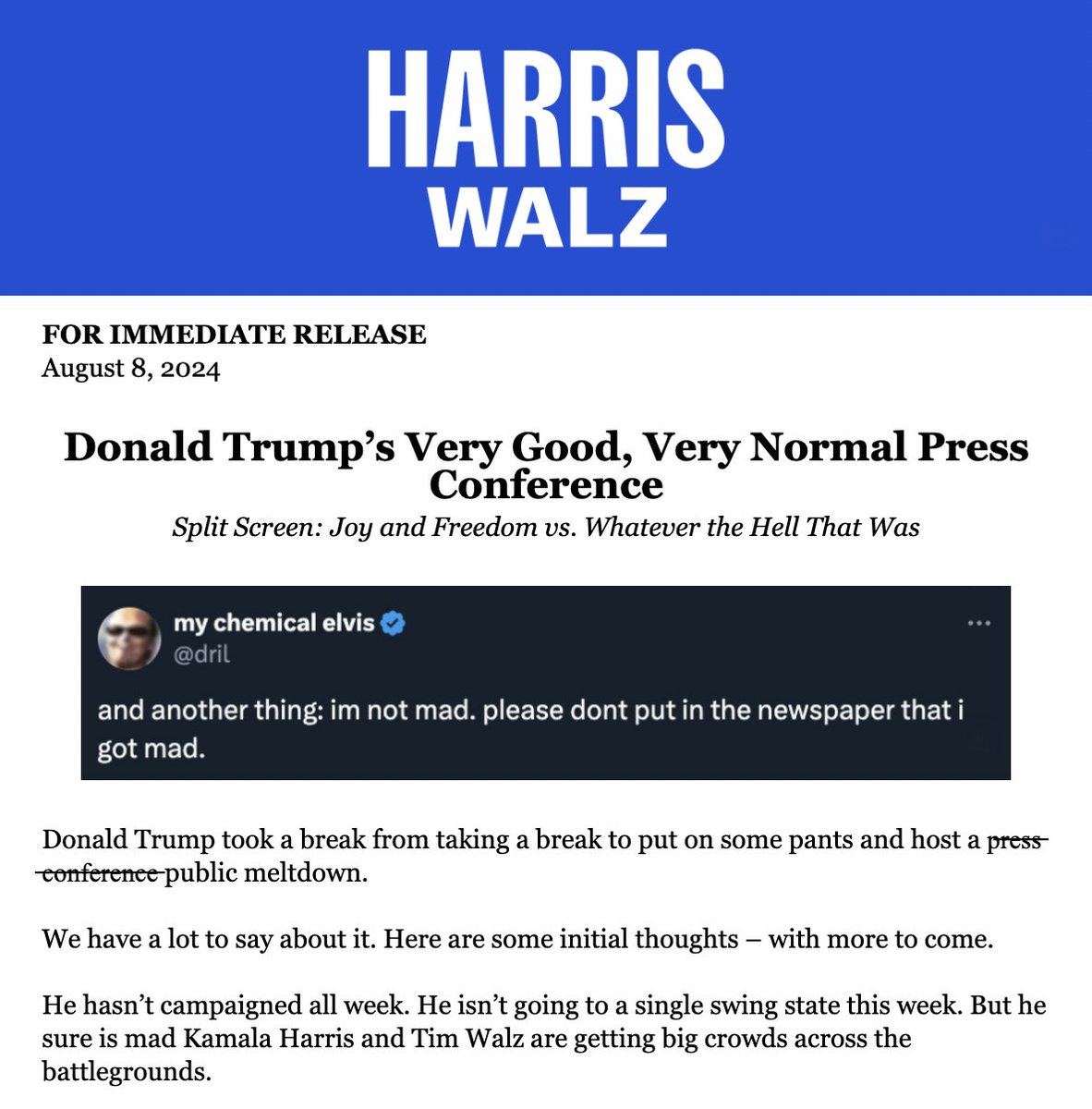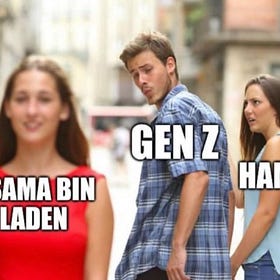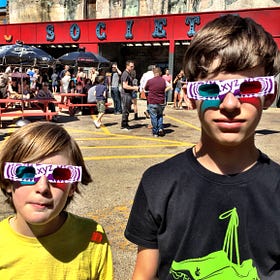The new way of talking about politics
How meme culture resurrected Kamala and reset the American narrative
Welcome to the weekend edition of The Experiment, your official hopepunk newsletter. If you’d like to support my work, become a paid subscriber or check out the options below. But even if you don’t, this bugga free. Thanks for reading!
It was all there for us to see, but none of the grownups who were supposed to understand how things worked spoke this new language. But now we can’t not see it, like fruit trees flowering at once. Suddenly, everywhere we look is full of color. People are calling this new language joy. This is what it feels like when a new generation takes over.
It got started slowly, and at a dark time, at that. In the 2020 election, Democratic primary voters were tearing the Party away from the country. The activists wanted big, bold changes that reordered an admittedly dysfunctional status quo, so Kamala Harris, a former district attorney and attorney general, was branded in a meme as a cop joyfully handcuffing a Black girl.
Before things got worse for her, there was one good moment that you can picture now: shaded by trees in a green field, her hair pulled back, wearing round sunglasses and a gray Nike half-zip pullover, smiling, always smiling, taking an important phone call. Maybe you can hear her voice, too: “We did it, Joe.”
But from there the videos of her, always smiling, often dancing, frequently manipulated to make her seem intoxicated, were yanked into a malevolent online context where a Black woman laughing and dancing isn’t coded as joy. Playing second fiddle to an increasingly infirm senior citizen didn’t help, either. This portrayal of Kamala Harris as an unserious, intellectually inferior person landed with its intended audience.
Earlier this summer, an elderly relative suggested to me that Joe Biden put Kamala on the ticket so no one would ever assassinate him.
“What do you mean?” I asked. The underlying assumption was so nakedly racist and sexist that I initially was simply confused. And then I got it. To this person’s mind, the idea of Kamala as president was so laughable that no one would consider shooting Biden, even as unpopular as he was.
“I don’t know about her laughing all the time,” said my relative.
By that time all the grownups had made up our minds about Kamala. She was a bad candidate who had tons of turnover in her office. She couldn’t hack it in this league. Republicans and the social justice warriors would eat her alive. Democrats were despondent about Biden, but Kamala was no one’s Obi Wan Kenobi. She was no one’s only hope.
Conversations are entirely dependent upon context, unburdened by what has been. Yelling “fire!” in a movie theater carries a different meaning than at home when you see flames in the kitchen. In the context of late-stage democracy, Kamala talking about coconut trees made her look inauthentic.
A funny thing was happening on the way to the downfall of the republic, though. Adults forget that kids are always watching us. And while the Biden folks were insisting upon the formerly agreed-upon reality—We really did pass the infrastructure bill! Biden re-united the western alliance against Russia! There is no recession, folks! Trump is still, you know, Trump!—Generation Z was getting its news from TikTok more than every other media source combined, which is where they were re-introduced to Kamala.
Except this time she wasn’t the cop. This time she was laughing and dancing. She even seemed a little buzzed, which to Gen Z was coded as something different than to a generation raised on Gone With the Wind. To Gen Z, “What can be, unburdened by what has been” sounded pretty damn good.
Rockets need accelerants to achieve liftoff. Kamala had several: Team Biden’s leak-proof handoff on a Sunday afternoon, a fearsome organizing effort led by Black Democratic women leaders, a new pragmatism among the online left, and, most of all, a completely new way of having a national political conversation in a context in which being unburdened by what has come before suddenly sounded amazing to everyone who didn’t want Donald Trump to be re-elected president, which was most people. Suddenly, that coconut tree thing made total sense.
As the rocket took off, Generation Z Yankee-doodled “laughing Kamala” from a bug to a feature.
In the hands of her online fans, Harris’s word salad has been replated as hypnotic internet speak. Her confounding coconut tree quote — “You exist in the context of all in which you live and what came before you,” she went on to say — now circulates as a symbol of the giddy high produced by her dizzy rise in a destabilized campaign. Her dance moves have been set to Charli XCX songs and filtered through Charli’s lime-green “Brat”-era branding, bathing Harris in her chill hot-mess pop star glow. Even “Kamala Harris is a cop” has been reclaimed, with an exaggerated wink, by supporters eager to fashion it into a winning general-election pitch.
The role of the audience in American politics fundamentally changed. For a long time we sat at home and received transmissions in newspapers and over the airwaves. Then we engaged with reporters online, driving engagement for social media platforms and clicks for legacy media websites. Now Gen Z is remixing reality to imbue political images with their own messages. “Kamala IS brat,” posted Charlie XCX, but so was the audience. With a suddenness that left the grownups grasping for metaphors—It’s a honeymoon! A sugar rush!—Generation Z existed not shut out of the conversation but squarely in the context of all in which they lived.
The couch tweet is the perfect example of this new mode of meme-based cultural conversation. The AP first fact-checking the claim and then pulling it down imprinted absurdity on the situation, and mayhem ensued. JD Vance didn’t have sex with a couch, but he did have views about maternity and taxation that seemed about as strange. Tim Walz entered the chat and called him “weird,” and for about a week all we saw online were couch jokes about how the Shillbilly was weird. Locusts chew more slowly than the Internet destroyed Vance.
Walz stayed in the chat and joined the ticket, adding a new version of masculinity to a generation starved for positive, age-appropriate male role models. It was similar to 2008’s analog meme, “Obama likes your bicycle,” except this time Walz fixed your bicycle, doesn’t care what color your text bubbles are, and can give you a ride to the airport. Armed with a video of him at the state fair with his daughter and a picture of him holding a piglet, Gen Z used the Internet to build out his public persona as the dad you had before Fox News warped his brain.
The Olympics played a role in cementing the conversation track. After winning a gold medal, Simone Biles, referencing an impolitic remark of Trump’s, posted, “I love my black job.” To a video of Raygun’s eye-of-the-beholder Olympic breakdancing performance, someone posted, “Siri, show me the media rationalizing Trump’s insanity…as an interpretive dance.” Endlessly the Olympic memes unspooled alongside political memes on social media with each user adding their two cents, adding to the conversation.
On Thursday, Kamala walked over to the reporters on the tarmac and asked, “Whatcha got?” but they had nothing, shouting questions that would have made sense when they were the gatekeepers of information and arbiters of relevance. Because by the time she took those steps toward them, she had already left them behind.
By then, the way we talk about politics had changed. In response to what it called “Donald Trump’s Very Good, Very Normal Press Conference,” Kamala’s campaign put out a statement unlike any in the history of presidential campaigns, at least at this level. For one, it’s hard to imagine Biden’s campaign quoting Dril, AKA Paul Dochney, one of the most powerful and influential people on social media.
The Kamala campaign is not acting like it just fell out of the coconut tree. Donald Trump is bonkers strange, JD Vance is weird, and there’s no sense pretending otherwise. Because to do so would appear to treat what is deeply weird as normal, which is what had been going on for so long. The memes are doing what the media couldn’t because the media was hamstrung by the convention of objectivity.
For a long time, Democrats have been engaging in the broader conversation—that is, communicating—in a way that unintentionally alienated them from those who agreed with them. To engage in a grownup discussion with the likes of Donald Trump doesn’t make you look like the grownup in the room, it makes you look like you don’t get it. And to go high when they go low validates a funhouse paradigm.
Meme culture, in which images are imbued with meaning that doesn’t need to be accurate to contain truth (see also: Vance and couches) is the only authentic mode of communication with a generation that was born around 9/11 and has grown up in a world in which the adults have continually insisted things were about to get back to a normal.
Every other segment of our culture and economy has been communicating this way for years, at least informally. Finally, American politics is communicating like real Americans. Now maybe politics can work again.
Jason Stanford is a co-author of NYT-best selling Forget the Alamo: The Rise and Fall of an American Myth. His bylines have appeared in the Washington Post, Time, and Texas Monthly, among others. Follow him on Threads at @jasonstanford, or email him at jason31170@gmail.com.
Further Reading
Vance's birtherism is weirder than you think
Hello to all the new subscribers, and thank you to the lovely and brilliant Charlotte Clymer for recommending this newsletter to her readers—and thank you to Elie Jacobs for technical assistance with this edition! Welcome one and all to the weekend edition of The Experiment, your official hopepunk newsletter. I was off last weekend in the middle of nowh…
TikTok is a national security threat to the USA, but not because of the Chinese or Russians
Welcome to the always free, reader-supported weekend edition of The Experiment. If you’d like to support my work, buy my Alamo book, buy some Experiment merch, drop some coins in the PayPal fountain, or become a paid subscriber. But even if you don’t, this bugga free.
"And how are the children?"
Every presidential museum has a subtext. Richard Nixon’s presidential library, for example, so effortfully replicates certain details of the White House that you can’t come away without the impression that he really wanted you to know that he was a real president before the thing that he had
We set up a merch table in the back where you can get T-shirts, coffee mugs, and even tote bags now. Show the world that you’re part of The Experiment.
We’ve also got a tip jar, and I promise to waste every cent you give me on having fun, because writing this newsletter for you is how I have fun.
Buy the book Texas Lt. Gov. Dan Patrick banned from the Bullock Texas History Museum: Forget the Alamo: The Rise and Fall of the American Myth by Bryan Burrough, Chris Tomlinson, and myself is out from Penguin Random House. The New York Times bestseller is out in paperback now!











Fucking nailed it
Sometimes you sit quietly in the ballpark and intellectually observe. Sometimes you hit it out of the ballpark. Such was the case today.